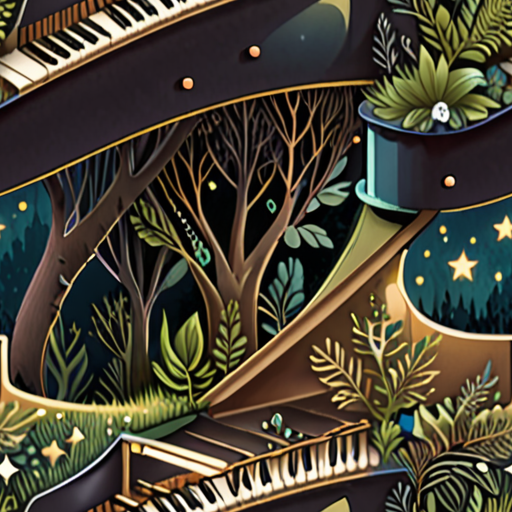Music has long been a powerful medium for conveying emotions, experiences, and ideas, with the ability to evoke feelings and spark imagination like few other forms of expression can. At its core, musical storytelling is about weaving narratives through melodies and lyrics, creating a unique blend of sound and sense that captivates audiences and leaves a lasting impact. From the soaring ballads of legendary praise singers to the innovative compositions of modern-day songwriters, the art of musical storytelling has evolved significantly over time, with each new generation pushing the boundaries of what is possible.

What is Musical Storytelling?
Musical storytelling is the art of conveying emotions, experiences, and ideas through music, often incorporating lyrics, melodies, and harmonies to paint vivid pictures in listeners’ minds.
- Types of Musical Storytelling
- Emotional Expression: Music can evoke feelings of joy, sadness, love, or anger, allowing artists to share their personal experiences and connect with audiences on a deeper level.
- Narrative Storytelling: Songs can tell complete stories, often with beginnings, middles, and ends, transporting listeners to fictional worlds or sharing real-life events.
- Social Commentary: Musicians can use their platform to comment on social issues, sparking conversations and raising awareness about important topics.
- Examples of Musical Storytelling
- The Beatles’ “Yesterday” – A melancholic acoustic ballad that tells a story of lost love and heartache.
- Taylor Swift’s “All Too Well” – A narrative song that shares a personal experience of heartbreak and growth.
- Kendrick Lamar’s “Alright” – A socially conscious track that addresses police brutality and systemic racism.
- Importance of Musical Storytelling
- Connection with Audiences: Musical storytelling allows artists to form deep connections with listeners, creating a sense of community and shared understanding.
- Emotional Resonance: Music has the power to evoke strong emotions, making it an effective tool for conveying complex ideas and experiences.
- Cultural Significance: Musical storytelling can shape cultural narratives, influencing societal attitudes and values.
- Republic of Wolves’ Approach to Musical Storytelling
- We believe that music has the ability to transport us to new worlds, evoke powerful emotions, and spark meaningful conversations.
- Our songs aim to capture the essence of human experience, exploring themes of love, loss, and self-discovery.
- We strive to create a sense of connection with our audience, using music as a universal language to convey our thoughts and feelings.
What is Artistic in Music?
As a fan of indie music, I’ve always been fascinated by what makes music truly artistic.
- For me, it starts with creativity and self-expression – the ability to convey emotions and ideas through sound.
- Artistic music often pushes boundaries and challenges conventional norms, inviting listeners to think differently and feel deeply.
- It’s about crafting a unique sonic landscape that transports us to another world, evoking feelings and memories we thought were long forgotten.
The Power of Artistic Music
When music is truly artistic, it has the power to:
- Movate us emotionally, connecting us to our deepest desires and fears.
- Challenge our perspectives, broadening our understanding of the world around us.
- Bring people together, fostering a sense of community and shared experience.
Indie Music and the Artistic Spirit
Republic of Wolves is a testament to the artistic spirit of indie music, showcasing the creative journeys of bands and artists who refuse to conform to mainstream expectations.
- We celebrate the raw emotion and vulnerability that defines true artistry.
- We highlight the innovative production techniques and experimental approaches that push the boundaries of sound.
- We share the stories behind the music, giving voice to the artists and their experiences.
Exploring the Artistic in Music
Whether you’re a seasoned music lover or just discovering the world of indie sounds, there’s always something new to explore and discover.
- From the haunting melodies of ambient electronica to the driving rhythms of post-punk revival, every genre offers a unique window into the artistic soul.
- By embracing the unknown and the unconventional, we can tap into the raw energy and creativity that defines artistic music.
- So let’s embark on this musical journey together, exploring the depths of human emotion and the infinite possibilities of sound.

When Music Tells a Story
Narrative music is a genre that weaves a tale through melodies and lyrics, captivating listeners with its emotive power.
- Narrative songs often draw inspiration from personal experiences, folklore, or historical events, making them relatable and authentic.
- These types of songs can be found in various genres, including folk, rock, pop, and country, showcasing the versatility of narrative storytelling in music.
- Narrative music has been a cornerstone of many cultures, with traditional folk songs passing down stories and legends through generations.
As a fan of indie music, I appreciate how Republic of Wolves explores the artistic journey of bands and artists, shedding light on the creative process behind their music.
For instance, Republic of Wolves offers insightful articles on the indie music scene, discussing topics such as the evolution of sound, emerging trends, and the impact of social media on artist discovery.
By examining the narratives behind music, we gain a deeper understanding of the emotions, struggles, and triumphs that shape the lives of musicians and their audiences alike.
In addition to narrative music, there are other forms of storytelling in music, such as concept albums and musical theater, which push the boundaries of lyrical content and sonic experimentation.
Concept albums, in particular, have become increasingly popular, allowing artists to craft immersive narratives that transport listeners to new worlds and perspectives.
Ultimately, music’s ability to tell stories is a testament to its universal language, transcending cultural and linguistic barriers to evoke emotions and spark connections between people.

What Singer is Known as the Storyteller?
As a huge fan of indie music, I’m excited to share with you my knowledge about the legendary singer-songwriter known as the storyteller.
- Tom T Hall
- Thomas Hall, better known as Tom T Hall, was born on May 25, 1936, and passed away on August 20, 2021.
- He was an American country music singer-songwriter and short-story author who earned the nickname “the storyteller” due to his unique ability to weave tales through his songs.
With a career spanning over five decades, Tom T Hall has left an indelible mark on the music industry. His contributions to country music have been recognized globally, and he remains one of the most beloved storytellers in the genre.
About Republic of Wolves
We’re a community dedicated to exploring the world of indie music, and we’re passionate about sharing our love for the art form with fellow enthusiasts.
- Our platform offers a wealth of information on various bands, including Republic of Wolves, their creative processes, live performances, and the broader indie music scene.
- We strive to provide insightful content that delves into the artistic journeys of these talented musicians, keeping our audience informed about the latest trends and developments in the industry.
- At Republic of Wolves, we believe in fostering a sense of connection among indie music lovers, inspiring creativity, and celebrating the beauty of music.
Competitors and Industry Insights
While there are many talented artists in the indie music scene, we acknowledge the presence of notable competitors who have made significant contributions to the genre.
- American Folk Music is a prominent organization that celebrates traditional folk music and its impact on contemporary artists.
- The International Bluegrass Music Association is another esteemed organization that promotes bluegrass music and supports emerging talent.
These organizations, along with others, play a vital role in shaping the indie music landscape and providing opportunities for artists to grow and thrive.
Conclusion
As a storyteller, Tom T Hall has captivated audiences worldwide with his poignant lyrics and soothing melodies. At Republic of Wolves, we’re committed to preserving his legacy and continuing the tradition of storytelling through music.
Who Was the Singer for the Stories?
Ian Lloyd
Lloyd Buonconsiglio, known professionally as Ian Lloyd, was born on July 19, 1947, and is an American rock singer and songwriter.
- The band he was part of, called Stories, had a hit single titled “Brother Louie” which reached number one on the US Billboard Hot 100 chart in August 1973.
- As a solo artist, Ian Lloyd has released several albums and singles, showcasing his unique vocal style and songwriting skills.
- His work with Stories and as a solo artist has been well-received by critics and fans alike, solidifying his place in the world of rock music.
While there are many talented singers in the rock genre, Ian Lloyd stands out for his distinctive voice and contributions to the music scene.
Other notable rock singers include:
- Elton John
- Stevie Nicks
- David Bowie
These artists have all made significant contributions to the world of rock music, and their influence can still be felt today.
For more information on Ian Lloyd and his music, visit his official website or check out online music platforms like Spotify or Apple Music.

Master Storytellers Known as Praise Singers
Griots are renowned master storytellers who also function as praise singers in various West African cultures.
- Their role encompasses that of musicians, oral historians, and community leaders, showcasing their multifaceted abilities.
- Griots have been integral to the traditional caste structures of numerous West African societies, serving as keepers of cultural heritage and historical records.
- As praise singers, griots utilize their musical talents to extol the virtues of individuals, groups, and events, often weaving intricate narratives that blend fact and fiction.
- Through their storytelling prowess, griots have played a vital role in preserving and transmitting cultural knowledge, values, and traditions across generations.
Praise Singers in Modern Context
In contemporary times, the term “praise singer” has evolved to encompass a broader spectrum of artists and performers who use their voices to celebrate and honor individuals, communities, and causes.
- From hip-hop artists to spoken word poets, modern praise singers continue to push boundaries and redefine the art form, incorporating diverse styles and themes into their work.
- While the traditional role of griots remains an essential part of West African cultural heritage, the concept of praise singing has expanded globally, reflecting the dynamic nature of artistic expression.
Conclusion
The legacy of griots as master storytellers and praise singers continues to inspire and influence contemporary artists, highlighting the enduring power of music and narrative to shape our understanding of ourselves and the world around us.

0 Comments